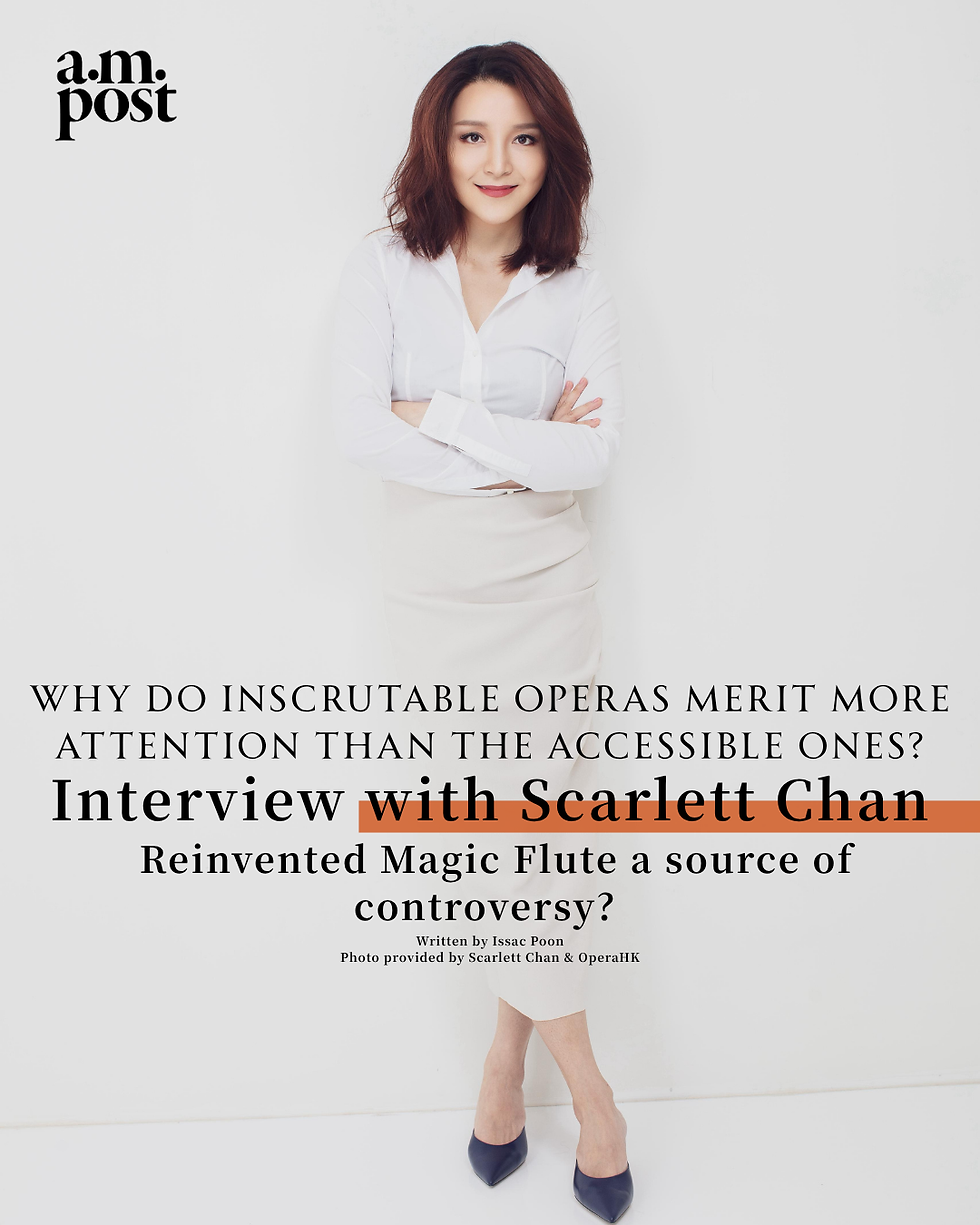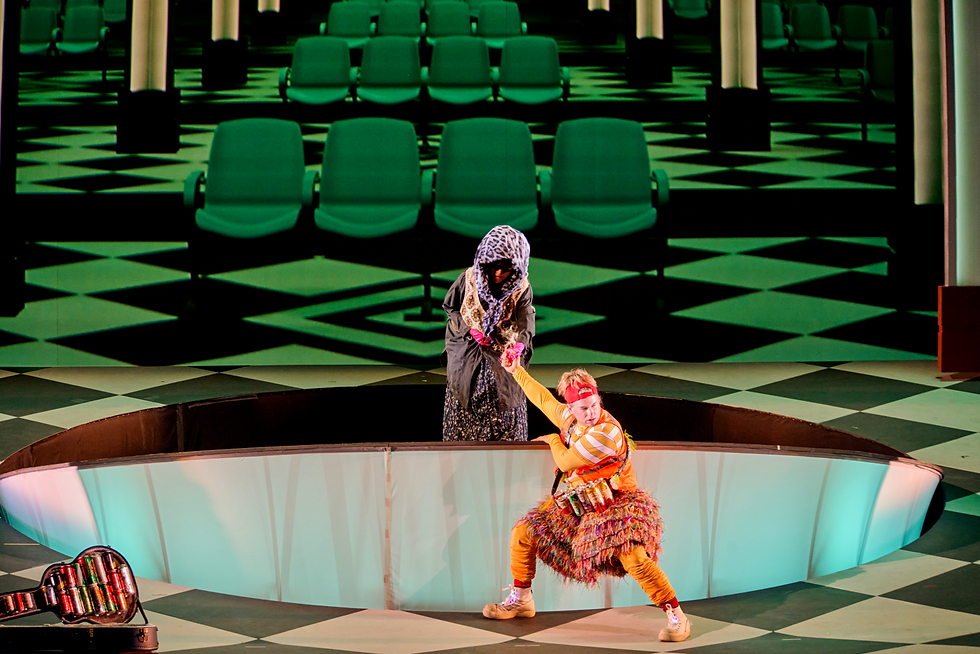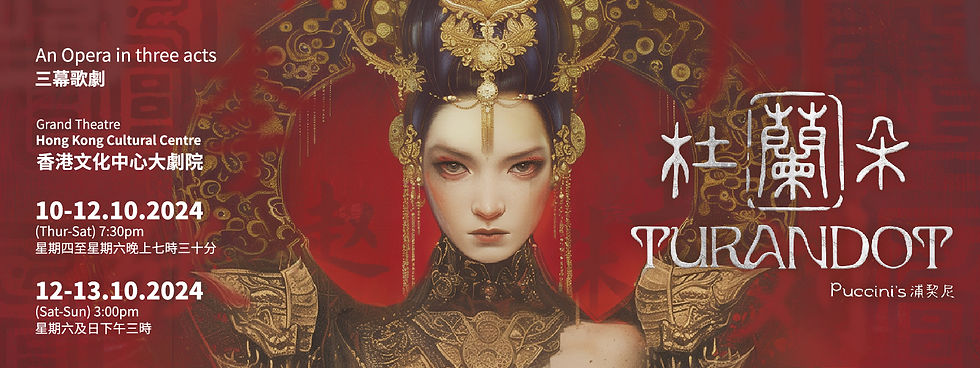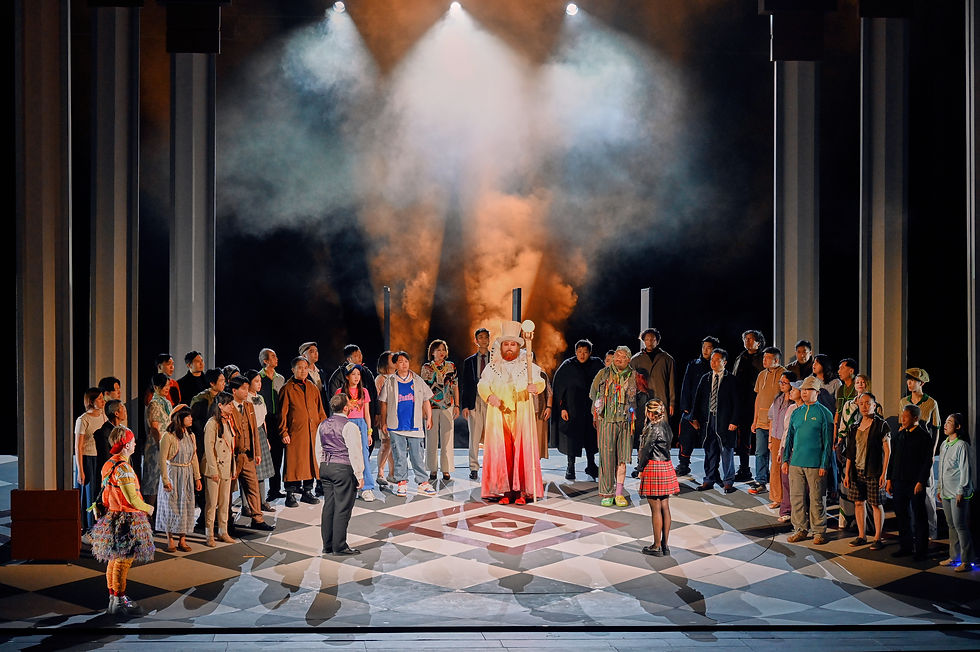Interview with Ms Scarlett Chan, a renowned concert pianist and a seasoned administrator | Reinvented Magic Flute a source of controversy? Why do inscrutable operas merit more attention than the acces
- experience am space

- 2025年8月2日
- 讀畢需時 8 分鐘

Recently, a local adaptation of the opera Magic Flute has become a subject of heated discussion. In view of this, ArtMap sought the perspective of Ms Scarlett Chan (formerly known as Jie Chen), whose deep expertise spans both artistic creation and administration. As a successful concert pianist, she knows the heart of performance intimately; as the founder of a university music department and a seasoned administrator with credentials from a world-class institution, she possesses a rare insight into the strategic challenges of arts organisations. This dual-identity—the fusion of an artist's sensibility with a leader's rationality—makes her the ideal voice to analyze the current controversies in opera and envision the industry's future. At ArtMap's invitation, she shares her profound insights below, speaking in her capacity as an independent observer.
Disclaimer: The views expressed herein are solely those of Scarlett Chan in her personal capacity. They do not represent the standpoint or policies of Opera Hong Kong or its board of directors.

The door to opera should never be closed, even some people may get lost when it is open.
This past May, Mozart’s opera classic The Magic Flute made its appearance at the Hong Kong Cultural Centre. Contrary to the conventional opera stage, the story starts at an MTR station, transporting the viewer to a world where reality and fantasy meet and meld. This joint project by the quadrumvirate of Opera Hong Kong, Central Opera House, State Opera South Australia, and Beijing Music Festival confronts the audience head-on with its stunning visuals and narrative. Some appreciate its boldness, while others are left bewildered.
Given the divided opinion over the stylistic change, Scarlett Chan, does not shy away from controversy. In this interview, she dons the role of an arts observer as she offers her take on innovation, sheds light on the collision and interaction between contemporary audience and classical art, before citing the mega cultural events through the remainder of the year she most looks forward to.

This is not the Magic Flute in your folks’ time
This year, Opera Hong Kong turned The Magic Flute into a laboratory, giving its visuals and narrative a radical facelift. Audience feedback varied. On Xiaohongshu, for one, some people dismissed it as ridiculous, while others were flabbergasted by the idiosyncratic, whimsical character styling and storyline. “Neither Hong Kong nor Western style - an oddball that’s totally out of place”; “Too abstract to comprehend” were some direct feedback from the audience.
Funnily enough, The Magic Flute itself was considered an ingenious boundary pusher during its premiere in 1791. Breaking free from the mainstream Italian opera monopolised by the aristocrats, the libretto, written in German, incorporated dialogue into vocals; and to top it off, the story juxtaposed serious philosophical allegories (e.g. Enlightenment ideas of Freemasonry) with comical, fairytale-like narrative elements. Instead of the palace or highbrow opera houses, Mozart and dramaturg Emanuel Schikaneder decided to stage it at a public theatre in the suburbs of Vienna. The move itself signified a downward shift and breakthrough in the context of art.
“Artists of each generation are working to lead audiences out of their comfort zone.” Scarlett Chan does not mince her words: “If we keep doing the same old thing, first, we can’t draw young audiences in, and the industry won’t be able to sustain itself; second, no discussion will happen to urge people to reflect, question or make changes.” With dual identities as an artist and an administrator, Scarlett understands very well why this modernised Magic Flute can’t win everyone over instantly. She also points out the detailed reviews written by some audience members, who explained their likes and dislikes act by act. “These connoisseurs were incredibly attentive. You can tell they were watching the production with all their hearts, paying attention to the finest details.” Scarlett maintains that these voices are evidence of the arts making their way into social discourses, and that the performer and the viewer should relate to each other through dialogue, rather than a one-way conversation.

“Innovation always carries risk. They’re two sides of the same coin.” A pianist by profession, the founder and head of the University of Shanghai for Science and Technology’s music department, as well as a distinguished alumnus of the Harvard Kennedy School in the United States, Scarlett is well aware of the contrasting feedback from audiences of different generations, and the inevitable risks that come with change. “We can’t let these foreseeable queries stand in the way of innovation. This truly puts to the test a leader’s willpower, decision-making skills, and accountability.” She goes on to analyse a critically acclaimed adaptation of the opera Turandot last year, which won the audience’s hearts with a variety of Chinese cultural elements. Today, the demographics of Hong Kong’s opera-goers are increasingly diversified, with young viewers from the Greater Bay Area becoming a new force to be reckoned with. “They won’t stay quiet, they’re more than ready to make their voices heard,” Scarlett adds.
Without doubt, controversy touches upon the cultural gap between opera and modern audiences. “The older audience tended to say, ‘It’s so refined I don’t quite get it.’ But young people today would simply say, ‘So absurd! It’s beyond me.’” To Scarlett, such differences pose not just a challenge but an opportunity. With extensive experiences running and managing arts organisations in the United States, China and the HKSAR, Scarlett is highly sensitive and receptive to the interplay of diverse cultures, and she values in particular such sincere, candid comments. Every successful adaptation, half-jokingly she says, must strike a perfect balance between being an unexpected treat and a complete fiasco, which is a challenge every creative team must take on.
So, how should contemporary audiences go about understanding these operatic adaptations? “I hope we could look beyond the appearance for the inner essence, staying focused on the perennial theme. Truth, benevolence and beauty - romance, growth and sacrifice, in other words - are at the core of all artistic practices.” She doesn’t fantasise about social media: “Fragmented communication probably lacks depth, but I hope it would serve as highlights to draw people to the theatre.” Materials like short reels, production stills and teasers are the first attempts to unleash audience imagination.

Grand finale of classical epic: Aïda on Hong Kong Arts Development Council’s 30th anniversary
When asked about other cultural extravaganzas on the horizon, Scarlett points to the upcoming opera Aïda in October as a heavyweight. This four-act opera composed by Verdi in 1871 was set in ancient Egypt, tracing the romance and sacrifices between Egyptian warrior Radamès and Ethiopian princess Aïda. With the princess captured and enslaved, the lovers are torn apart by wars and power struggles, making it one of the most powerful tragedies in operatic history. Over the years, Aïda has been staged by many top-tier opera houses, namely Metropolitan Opera, Vienna State Opera, and Teatro alla Scala as their magnum opus. Marked by a massive scope, epic scenes and demanding vocal skills, it has long been hailed as a classic that measures the prowess of any theatre company.
This time, the classic will be restaged by Opera Hong Kong all on its own without any co-presenters. The star-studded lineup includes celebrated Spanish conductor Ramon Tebar and the world-famous arts director Hugo de Ana, the latter undertaking scenic design, wardrobe, hair and makeup design. This is yet another close-knit collaboration between Opera Hong Kong and global production talent. The three main themes in Aïda - love and faith, self-identity, sacrifice and devotion - resonate deeply today with Hong Kong and the Greater Bay Area. In Scarlett’s opinion, these subject matters echo with not only the cross-cultural context of the time we are in, but also with many youngsters who are exploring their self-identity. “These topics are timeless,” she contends.
Any effective ways to attract audiences with no opera experience at all? Scarlett’s answer is straightforward: “Position it as a Hollywood blockbuster - striking visuals, music and a winding, complex story all rolled into one.” For newcomers, this way probably goes down better than “opera” per se.

Beyond the restaging of classics, Scarlett is also a passionate advocate for telling Hong Kong's own stories. She has noticed that in recent years, more works have been made for young audiences. For instance, she points to industry buzz about a potential original musical on pandas towards the year's end as a noteworthy trend. These attempts, closely related to buzz topics and likely to draw family and young audiences, surely deserve more attention.
“Hong Kong has a whole wealth of stories that are worth sharing on the stage.” Scarlett supplements her observation with examples like the fighting spirit under the Lion Rock, the rags-to-riches stories of Hong Kong’s first generation of entrepreneurs, and even cross-border romance. “Imagine a time when transportation was not as convenient as it is today, two young people from Hong Kong and the Mainland get to encounter, understand and love each other… How does their passion stand the test of time and space?”
That being said, Scarlett also admits: “In the face of creativity anxiety, faith is our armour.” Local productions are shackled by the dual obstacles of social pressure and identity crisis. “As audience reviews become more and more immediate, the pressure the creatives have to face becomes more daunting than ever. That’s even worse if you aren’t entirely sure who you are and what you stand for. In no way can your output be convincing.” To strike a responsive chord with the audience, she reiterates that artists must believe 200% in their own practices.
As for the grooming of young talent, Scarlett has full confidence in Hong Kong’s emerging artists. She cites the industry's Local Young Artists Scheme, which has been in place for years, as a prime example. “I firmly believe,” she says, “that the next opera star would be someone from Hong Kong.”

From resource integration to regional co-production
When it comes to brand building and regional collaboration which are crucial to the development of the arts, Scarlett highlights the impetus brought by competition and the tremendous value of joint efforts. “Competition is a good driving force. However, an epic production - from its initial conception to final presentation - is a costly endeavour. It’s a huge pity if it’s only performed in Hong Kong. Rather than working separately on our own, what about joining forces and pooling resources together?” She also emphasises that nurturing talent is key. “Students of the Hong Kong Academy for Performing Arts, for instance, may perform in crowd scenes, help out behind the scenes or on the spot as interns. The Greater Bay Area (GBA) is also home to advanced hardware facilities, arts administration and education institutions. Once all the resources are well brought together, it is entirely possible to develop a regional co-production or touring network. While Hong Kong serves as a content maker, performing venues in GBA and across the Mainland form the distribution channel, joining hands to bring great works to a wider market.” She concludes that for arts organisations in Hong Kong, a sustainable future should be built step by step: “Cooperation should first begin on the local level, gradually extending to GBA and eventually all parts of the nation.”.
To Scarlett Chan, a pianist-turned-arts administrator, opera is no longer a secluded gem placed on a pedestal but an accessible art actively reaching out to the wider community. It embraces dialogue, never shuns dispute or even failure; it is a public laboratory which stays hungry and foolish forever, always ready to start anew…
Written by Issac Poon
Translation by Elbe Lau
Photo provided by Scarlett Chan & Opera HK
#ArtMap #artmap_artplus #cultural #artmap_JAR #JieChen #OperaHK #immersiveOpera #ScarlettChan #MagicFlute #DieEntführungAusDemSerail #Aida #Turandot
——— Explore Art Map ———
Enquiry |advertising01@artmap.com.hk
@artmap_artplus
@artplus_plus
@ampost_artmap














留言